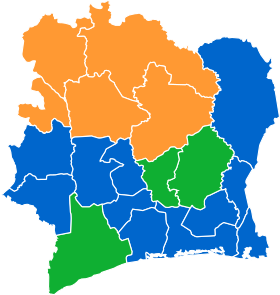
Back انتخابات الرئاسة الإيفوارية 2010 Arabic Прэзідэнцкія выбары ў Кот-д’Івуары (2010) Byelorussian Präsidentschaftswahl in der Elfenbeinküste 2010 German Elecciones presidenciales de Costa de Marfil de 2010 Spanish Norsunluurannikon presidentinvaali 2010 Finnish Élection présidentielle ivoirienne de 2010 French Elezioni presidenziali in Costa d'Avorio del 2010 Italian 2010年コートジボワール大統領選挙 Japanese Ivoriaanse presidentsverkiezingen 2010 Dutch Wybory prezydenckie na Wybrzeżu Kości Słoniowej w 2010 roku Polish
| |||||||||||||||||
| |||||||||||||||||
| |||||||||||||||||
 |
|---|
|
|
Presidential elections were held in Ivory Coast in 2010. The first round was held on 31 October,[1] and a second round, in which President Laurent Gbagbo faced opposition leader Alassane Ouattara, was held on 28 November 2010. Originally scheduled to be held in 2005, the vote was delayed several times due to the Ivorian Civil War and difficulties involved in the organization and preparation of the elections. A peace agreement between the government and the former rebel New Forces was signed on 4 March 2007,[2] and in late April 2009, it was announced that the elections would be held by 6 December 2009, and that the date would be announced shortly.[3] On 15 May 2009, the date was announced to be 29 November 2009.[4] On 11 November, the elections were postponed again due to delays in the electoral roll. It was announced on 3 December 2009 to be held in late February or early March 2010.[5]
The elections, in which ethnicity and the country's north–south divide played a crucial role, ultimately pitted President Gbagbo, who had a strong support base in the south, against the long-time opposition leader and former Prime Minister Ouattara, who had overwhelming support in much of the north. The events leading up to the second round and following it were characterized by serious tension and some incidents of violence, and the preliminary report of the Carter Center "cautions against a rush to judgment regarding the overall credibility of the election", but most observers considered that the overall result was not compromised, and that the elections were essentially free and fair. On 2 December 2010, the Independent Electoral Commission (IEC) released provisional results showing that Ouattara had won the elections in the second round with 54% of the vote. However the President of the Constitutional Council (CC) immediately declared that the results were invalid[6] and the next day, in accordance with article 94 of the Constitution, the Constitutional Council declared Gbagbo the winner.[7] Both Gbagbo and Ouattara claimed victory and took the presidential oath of office. The ensuing events led to the 2010–2011 Ivorian crisis.
The international community, including the United Nations, the African Union, the Economic Community of West African States (ECOWAS), the European Union, the United States, and former colonial power France have affirmed their support for Ouattara, who is "almost universally acknowledged to have defeated [Gbagbo] at the ballot box," and have called for Gbagbo to step down, despite the fact that the body charged by the Constitution with determining electoral disputes had declared Gbagbo to be the winner.[8][9][10] On 18 December, Gbagbo ordered all UN peacekeepers to leave the country.[11] However, the UN has refused, and the Security Council has extended the mandate of the UN Mission in Ivory Coast until 30 June 2011. International powers have been in talks to enlarge the UN force in the Ivory Coast. The World Bank has halted loans to the country and travel restrictions have been placed on Gbagbo and his political allies.[12] The rising political tensions resulted in a sharp jump in cocoa prices, up to an increase of 10 percent, since the Ivory Coast is the world's largest producer of the crop.[13]
After fighting the Second Ivorian Civil War, Gbagbo was forcefully removed from office and Ouattara took office as the undisputed president on 11 April 2012. Afterward, Gbagbo was indicted and arrested by the International Criminal Court.
- ^ "UN mission takes note of new date for Ivorian presidential polls". United Nations. 5 August 2010. Retrieved 21 August 2010.
- ^ "Ivorian president vows to hold elections as scheduled", Xinhua (People's Daily), 10 July 2007.
- ^ "Africa | Ivory Coast polls 'by December'". BBC News. 29 April 2009. Retrieved 21 August 2010.
- ^ "Cote d'Ivoire to hold presidential election on Nov. 29". English_Xinhua. 15 May 2009. Archived from the original on 24 October 2012. Retrieved 21 August 2010.
- ^ "Bienvenue sur". apanews.net. Retrieved 21 August 2010.[permanent dead link]
- ^ Christophe Koffi, "Ouattara named winner of Ivory Coast election", AFP, 2 December 2010.
- ^ "Ivory Coast poll overturned: Gbagbo declared winner". BBC News. 3 December 2010.
- ^ David Smith (22 December 2010). "Ivory Coast: death squads on the rise as civil war looms". The Guardian. UK. Retrieved 23 December 2010.
- ^ Ivory Coast's Gbagbo defies world leaders, euronews.com, 4 December 2010, archived from the original on 2 October 2012, retrieved 8 December 2010
- ^ "Ivoirian Constitution | Embassy of the United States Abidjan, Cote d'Ivoire". Archived from the original on 15 October 2011. Retrieved 26 October 2011.
- ^ "BBC News - Gbagbo orders peacekeepers to leave Ivory Coast". BBC News. 18 December 2010. Retrieved 23 December 2010.
- ^ "US eyes bigger UN force in Ivory Coast". The Washington Post. Archived from the original on 3 July 2012. Retrieved 23 December 2010.
- ^ Alex Hawkes (22 December 2010). "Cocoa prices rise after Ivory Coast election turmoil". The Guardian. UK. Retrieved 23 December 2010.
© MMXXIII Rich X Search. We shall prevail. All rights reserved. Rich X Search



